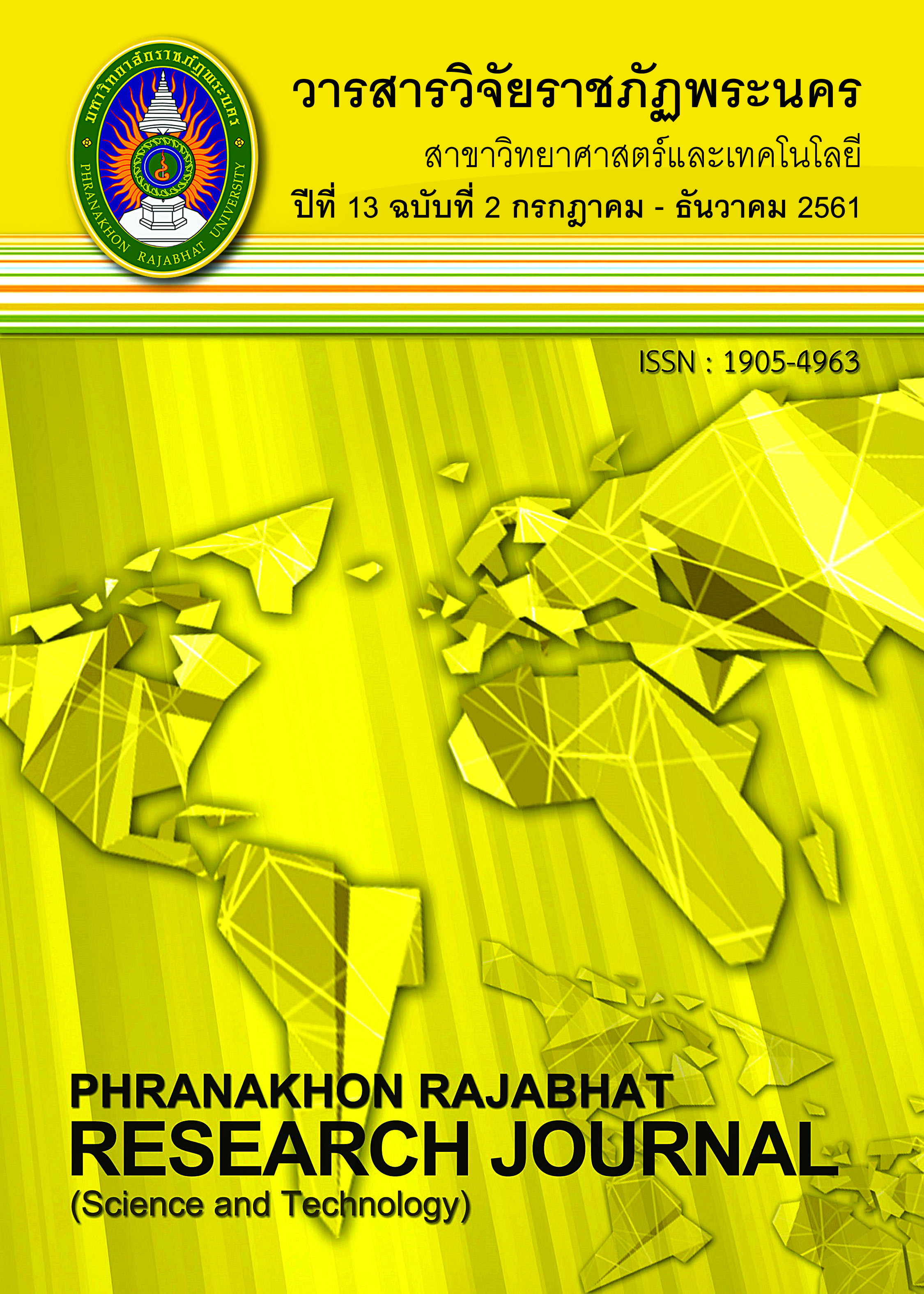GREEN SYNTHESIS OF Ag@Au CORE-SHELL NANOPARTICLES FOR COLORIMETRIC DETECTION OF CYANIDE
Keywords:
Ag@Au core-shell nanoparticle, Cyanide, Green synthesis, Colorimetric detectionAbstract
Cassava is considered one of the most important economic crops in Thailand. Cassava roots are the most commonly consumed or processed because of high carbohydrate or starch contents. However, cassavas contain cyanogenic glucosides, which are enzymatically degraded to extremely toxic hydrogen cyanide or cyanide. This work proposed an alternative method for the cyanide detection, which was rapid, simple and highly sensitive, to meet agricultural and industrial demands. Based on a colorimetric sensing for cyanide, the green-synthesized colloidal Ag@Au core-shell nanoparticles (NPs) were transparent purple solution and metallic core-shell NPs had spherical shape with a diameter of approximately 22 nm. When cyanide was added to the Ag@Au core-shell NPs solution, cyanide ion would etch the gold shell followed by the silver core, leading to gradual change of the solution color from purple to orange, yellow, and finally to colorless. The changes of the solution color could be potentially utilized for the colorimetric sensing of cyanide in a range of 0 – 0.8 mM with a detection time within 5 minutes. This study therefore reported a successfully developed cyanide measurement technique that was suitable for utilization in import/export businesses and classification of cassava varieties between sweet and bitter types.
References
Limsila, J., Limsila, A., Jaroenrat, S., Kathong, S., Tongklum, A., Wongkobrat, A., Junkhum, J., Sethasuk, J., Narintaraporn, P. & Thongsri, S. (2004). Cassava. 1st Edition. Bangkok: Idea Square Limited Partnership. (in Thai)
Panigrahi, S., Kundu, S., Ghosh, S.K., Nath, S. & Pal. T. (2005). Sugar assisted evolution of mono- and bimetallic nanoparticles. Colloids and Surfaces A: Physicochemical and Engineering Aspects. 264(1-3), 133-138.
Phetsahai, A., Thamaphat, K. & Nuntawong, N. (2016). Green synthesis of colloidal silver nanoparticles for surface-enhanced Raman scattering. Phranakhon Rajabhat Research Journal (Science and Technology). 11(1), 116-127. (in thai)
Piyachomkwan, K., Wanlapatit, S., Chotineeranat, S. & Sriroth, K. (2005). Transformation and balance of cyanogenic compounds in the cassava starch manufacturing process. Starch/Stärke. 57(2), 71-78.
Rojanaritphichet, J. (1989). Plant culture, processing industry and utilization of cassava. 1st Edition. Bangkok: Department of Agronomy, Faculty of Agriculture, Kasetsart University. (in Thai)
Sharma, V.K., Yngard, R.A. & Lin, Y. (2009). Silver nanoparticles: Green synthesis and their antimicrobial activities. Advances in Colloid and Interface Science. 145(1-2), 83-96.
Smith, E. & Dent, G. (2005). Modern Raman spectroscopy - A practical approach. West Sussex: John Wiley & Sons.
Thai Tapioca Starch Association (2017). Exporting tapioca product. Retrieved April 2, 2017, from https://www.thaitapiocastarch.org/th/information/statistics/export_tapioca_products (in thai)
Williams, I. (2001). Environmental chemistry: a modular approach. Chichester: John Wiley & Sons.
Zeng, J.B., Cao, Y.Y., Chen, J.J., Wang, X.D., Yu, J.F., Yu, B.B., Yan, Z.F. & Chen, X. (2014). Au@Ag core/shell nanoparticles as colorimetric probes for cyanide sensing. Nanoscale. 6(17), 9939-9943.
Downloads
Published
Issue
Section
License
โปรดกรอกเอกสารและลงนาม "หนังสือรับรองให้ตีพิมพ์บทความในวารสารวิจัยมหาวิทยาลัยราชภัฏพระนคร สาขาวิทยาศาสตร์และเทคโนโลยี" ก่อนการตีพิมพ์




